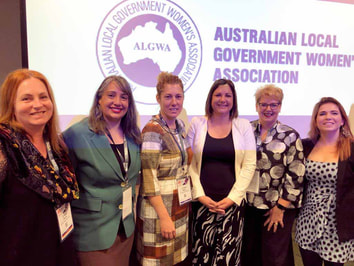 Macedon Ranges Shire councillor Janet Pearce, Bass Coast Shire councillor Leticia Laing, Mornington Peninsula Shire councillor Sarah Race, Federal Minister for Local Government Kristy McBain, ALGWA President and Maroondah City councillor Kylie Spears and City of Kingston deputy mayor Jenna Davey-Burns.
Macedon Ranges Shire councillor Janet Pearce, Bass Coast Shire councillor Leticia Laing, Mornington Peninsula Shire councillor Sarah Race, Federal Minister for Local Government Kristy McBain, ALGWA President and Maroondah City councillor Kylie Spears and City of Kingston deputy mayor Jenna Davey-Burns. AS A newbie to the conference game I was keen to suck the marrow out of my first Australian Local Government Association (ALGA) conference and National General Assembly in Canberra held a couple of weeks ago.
It was a worthwhile experience but I wonder whether there is hope of solving the challenges that face pretty much all of Australia’s 537 local councils.
Things are bad when even the experts are talking about using caravans as “temporary” homes and suggesting that councils should “try everything”. This was the advice from Regional Australia Institute professor Andrew Beer, University of South Australia, during the Regional Forum on day one.
If the national housing crisis brought on by supply chain issues, poorly delivered government incentives and Covid wasn’t enough, there is the increasing presence of natural disasters caused by climate change.
On day three we heard from Deloitte Access Economics director of policy and strategy Muheed Jamaldeen, who showed that the way Australia responds to natural disasters is setting the country on a pathway to financial and social ruin.
Alarmingly, the nation spends only three per cent of the natural disaster spend on planning and preparation as opposed to 97 per cent on reaction and recovery.
Australia stands to realise a $380 billion economic dividend resulting from proactive resilience planning and climate adaptation and mitigation initiatives should we address natural disasters from a lower carbon emission scenario.
Once the conference reached the time of debate on resolutions during the National General Assembly of councils I gained the chance to see how diverse councillor views are on issues ranging from electric vehicles to the Ukraine war.
With so many councillor egos in the room it was admirable to see ALGA president Linda Scott keep her cool and keep proceedings civil. Councillors are an opinionated bunch.
One council in NSW even called for the Assembly to support nuclear energy to form part of the national electricity grid. This motion was met by a collective groan and subsequently failed.
It was reassuring to hear from Dr Marcus Spiller, the president of the National Planning Institute of Australia and principal of SGS Planning and Economics, on day three.
As a regional council with a small population, Bass Coast Shire is heavily reliant on state and federal financial assistance to get even the most basic of infrastructure and services for the community. It sometimes feels like we are always panhandling.
Dr Spiller said Australian local councils do more with less, and continue to do so in spite of cost shifting, inadequate fiscal equalisation and rate capping across the country by state and federal governments.
This was only a snapshot from three speakers out of about 25 who presented to the conference and doesn’t include the multitude of conversations I had with councillors from across Australia.
What we all have in common is a deep care for our respective communities and there are some very talented and possibly even professional women who are leading the way.
But after five days of “conferencing” with around 1000 other council delegates I was well and truly spent. By the time I boarded my flight home with a plane-full of councillors, I was glad I was wearing a mask to pretend I couldn’t recognise anyone.
At least until the next conference I am placed in good stead.
The views expressed in this article are those of Leticia Laing and not the Bass Coast Shire Council.